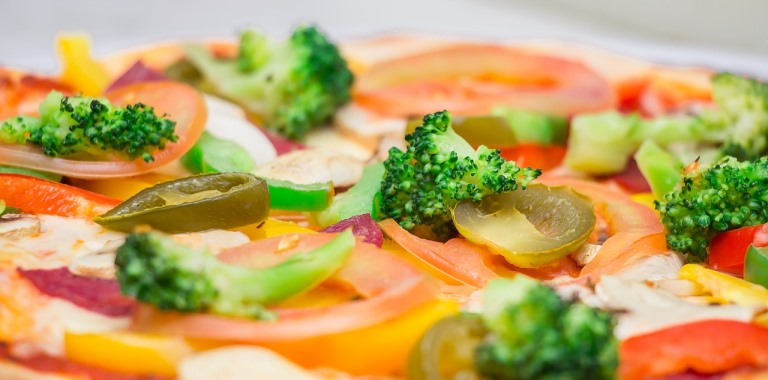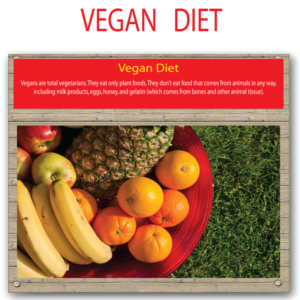
Vegetarian Diet For Health
A vegetarian diet for health is generally one that is plant-based and contains no meat. There are also different sub-types of vegetarianism. For example, lacto-ovo vegetarians do eat some animal by-products such as dairy products and eggs, whereas lacto-vegetarians don’t include eggs in their diet, but they do eat dairy products.
Strict vegetarians may not consume any animal by-products at all, including dairy, eggs and honey.
Vegetarians are classified according to their animal meat restrictions and other omissions or additions that they follow in their diet.
Studies have shown benefits for health to a vegetarian diet, whereby vegetarians have lower risks of coronary artery disease, obesity, cancer and hypertension.
Becoming a vegetarian is often more than just changing your eating patterns and sticking to a fruit and veggie lifestyle. There are many vegetarians who consider themselves animal rights advocates and their diet only represents one aspect of their belief structure.
If you plan on changing to a vegetarian diet you must take care that key dietary needs formerly obtained from animal sources will be still available to you. This can be done by learning which plant, nut or grain sources supply the same nutrients.
Calcium
Milk and other milk products have long been touted as primary and even preferred sources of calcium, however the effectiveness of this source is being questioned by many.
For vegetarians this isn’t a problem as they obtain their calcium through eating dark green leafy vegetables. There is an increasing belief that this form of calcium is more readily absorbed by our body.
Calcium plays a major role in keeping the bones healthy and in regulating several muscle and nerve functions. Most of your absorbed calcium intake is stored in your bones and teeth. It is important to ensure sufficient uptake as a deficiency will cause your body to leech calcium from your bones to carry out other vital functions.
Spinach, collard and kale are a few examples of veggies that are rich in calcium.
Protein
Many people wrongfully believe that vegetarians don’t get enough protein if they don’t eat meat. However, by choosing the right variety and quantities of protein in nuts, fruits and vegetables etc., your body need never be deprived of the protein it needs.
Avocado, asparagus, beet greens, spinach and peas are some examples of vegetables that are rich in protein.
Iron
Iron is one of the most essential nutrients needed for efficient forming and function of hemoglobin, which serves as the oxygen carrier in our blood. A deficiency in iron may cause anemia, a condition which is more common in women and children.
Most vegans and vegetarians do have satisfactory levels of iron in their body. Part of the reason for this is that a vegetarian diet contains vitamin C which encourages iron absorption. Many vegetables favored by vegetarians have high levels of available dietary iron.
Broccoli, bok choy and tomatoes are a few vegetables that contain high levels of iron and
vitamin C.
Omega 3 fatty acids
Omega 3 fatty acids are very needed for many functions and processes in our body. They help control blood clotting and aid in the formation of healthy cell membranes. Recommended amounts for one’s daily intake of omega-3 fatty acids varies from source to source. The majority of nutritionists and medical experts agree that the more omega-3 fatty acids you consume, the better it will be for your health.
Soybean, flaxseed, walnuts, Brussels sprouts, kale and spinach are good sources of omega-3 fatty acids.
Other Nutrients
Some other key nutrients that must be included in your daily diet are vitamins D and B12 and the minerals zinc and iodine. These are all readily available from non-animal sources. To maintain peak nutritional health, a vegetarian’s diet will usually incorporate grains, legumes, nuts, vegetables and fruits.

10 Ways to Consume Protein
1. Grains – Tons of grains have protein, including oats, wheat, rye, barley, corn, and rice, to name a few! Think about all the grains you eat per day. One cup of oatmeal has 6 grams of protein, two slices of whole wheat bread has 7 grams of protein, and one cup of brown rice has 5 grams of protein.
2. Legumes – This includes beans, peas, and lentils. 1 cup of kidney beans has 13 grams of protein alone, and a cup of lentils provides 18 grams!
3. Nuts – Nuts, including peanuts, almonds, cashews, and even peanut butter, are a great source of protein. Two tablespoons of almonds contain 4 grams of protein, and two tablespoons of peanut butter contain 8 grams.
4. Seeds – Seeds, such as sunflower and sesame seeds, make a great snack and are very healthy for you. Seeds are commonly consumed on breads and with other grains. One tablespoon of pumpkin seeds contains 2 grams of protein, and a tablespoon of flax seeds contains 1.5 grams.
5. Vegetables – Vegetables, common in a vegan’s diet, are a great way to get protein. One cup of broccoli contains 4 grams of protein, one cup of portabella mushrooms contains 5 grams, and one cup of spinach provides 6 grams.
6. Fruits – Vegetables are known to be a rich source of protein, but few realize that some fruits also contain a considerable amount of protein. One cup of dates contains 3.6 grams of protein, a medium avocado contains 4 grams, and one cup of guava contains 4.2 grams.
7. Tofu – 1 cup of tofu provides an impressive 20 grams of protein. People are more likely to consume only about a half a cup at a time, that is an easy 10 grams of protein.
8. Soy Milk – Providing 7 grams of protein per cup, soy-milk is a great, delicious source for your protein.
9. Veggie Burgers and Other Meat Substitutes – These are becoming increasingly popular, especially “veggie” burgers made for vegans. Did you know that one veggie patty provides you a whopping 10 grams of protein?
10. Quinoa – Quinoa is considered the king of whole grains. 1 cup of cooked quinoa will get you 18 grams of protein!
The success of a vegetarian diet for health is A Varied Diet
As you can see from the list above, it’s quite easy for a vegetarian to consume the proper amount of daily protein. Let’s say for breakfast you have a cup of oatmeal and a guava, for lunch you have a veggie burger with soy milk, for a snack, you have some peanuts, and for dinner, you have lentil salad with spinach, half a cup of cooked tofu, and kidney beans. That’s 82 grams of protein!
What made you decide to shift your diet and become a Vegetarian ?